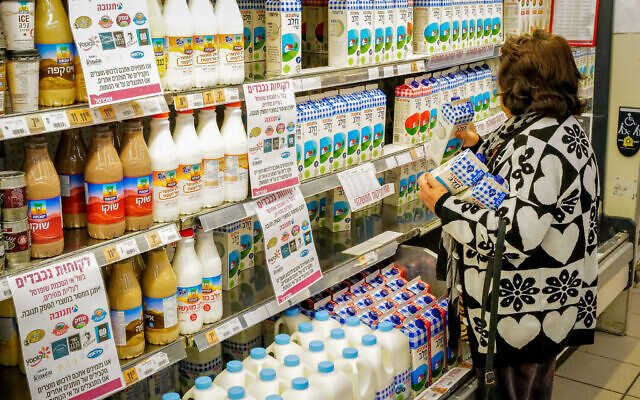As inflation persists, Bank of Israel hikes interest rates for 10th time, to 4.75%
Central bank lifts borrowing costs by 25 basis points, citing inflation above 5% and a tight labor market; sees signs of moderation in economic activity
Sharon Wrobel is a tech reporter for The Times of Israel.

The Bank of Israel on Monday raised its benchmark interest rate for a 10th consecutive time, lifting borrowing costs by 25 basis points to 4.75% as it struggles to tamp inflation growth in recent months.
“Economic activity in Israel is at a high level, and is accompanied by a tight labor market, although there is some moderation in a number of indicators. Inflation is broad and remains high,” the central bank said in a statement citing the reasons for the rate hike. “The tighter monetary policy and moderation of activity abroad are expected to lead to a slowing in the pace of inflation alongside some slowdown of economic activity in Israel.”
The central bank’s move comes after the consumer price index (CPI), a measure of inflation that tracks the average cost of household goods, rose in April at almost double the rate than was forecast. The April CPI increased by 0.8% above analysts’ expectations of 0.4% to 0.5%, taking annual inflation over the past 12 months to 5%, according to data released by the Central Bureau of Statistics on May 15. The April CPI monthly reading is the highest since July 2022.
Over the past year, the Bank of Israel has steadily hiked its benchmark interest rate — to 4.5% in April this year from a record low of 0.1% — in a bid to rein in inflation. Despite the steps, inflation has been hovering above 5% in annual terms for more than six months, far above the government’s target range of 1% to 3%.
“Inflation in Israel is ‘sticky’ and high, and it is notable that the level by which inflation has been reined in is low compared to what has occurred in other developed countries,” Bank Leumi economists wrote in a research report, adding that an additional rate hike above this level could be in the offing this year.
Following April’s high inflation figure, economists at Leumi, Bank Hapoalim and Psagot Investment house had already put up their stakes for borrowing costs to go up to 4.75%. Earlier this month, the US Federal Reserve lifted interest rates by 0.25 percentage points to a benchmark rate of between 5% and 5.25%, up from near zero in March 2022.

The aggressive interest rate hikes by the Bank of Israel have rapidly fueled the costs of mortgage holders who are struggling to pay off monthly payments. Over the past year, the average cost of monthly mortgage payments has gone up by an estimated NIS 1,000.
Bank of Israel governor Amir Yaron said the central bank remains committed to do everything to bring down inflation back into the government’s target range.
“We understand the pain, but if we had not taken these steps we could have found ourselves in double-digit inflation and in a more painful situation, where people start writing contracts in dollars or another currency,” Yaron told news outlet Ynet after Monday’s rate decision.
Meanwhile, the country’s banks have been the main beneficiaries of high borrowing costs, seeing their profits balloon this year, led by a sharp rise in interest income earned. Bank Hapoalim, one of Israel’s two largest lenders, on Monday posted a net profit of NIS 2.01 billion ($551 million) in the first quarter of the year as net interest income surged 49% from a year ago.
United Torah Judaism lawmaker Yisrael Eichler on Monday demanded that Yaron quit over the repeated interest rate hikes. Eichler acknowledged the independence of the governor, but said he needs to be held accountable for his perceived failure to halt soaring prices.
In its announcement, the Bank of Israel contended that inflation remains high in a “wide range of CPI components [but] looking at the past six months, and even more so over the past three months, the pace of inflation is lower than the year-on-year inflation,” while pointing to signs of moderation in economic growth.
The Israeli economy grew 2.5% in the first quarter of 2023, slowing down from rapid growth of 5.3% in annualized terms in the fourth quarter of 2022.
“The latest data on economic activity published in Israel show us that the interest rate effect has not yet been reflected in economic data, while domestic demand — consumption and investment — remains high,” said Psagot investment house chief economist Guy Beit-Or. “In order to see a real moderation in sticky inflation, a significant slowdown in economic activity is required, and in our assessment, a significant impact is yet to come with the interest rate effect on the one hand, and high inflation on the other, eroding the purchasing power of Israeli households significantly.”
In recent weeks, Israel’s largest food manufacturers announced price increases in the retail sector, led by milk products and products such as instant coffee, sugar, and cocoa. Food manufacturer Strauss said it was raising prices of some products in June, half a year after a hike on a range of other items. The price hikes will be as high as 6% on some items, and will average at 1.4%.

In early May, it was announced that regulated dairy products would see a rise of over 9% as part of an expected 16% total increase across three years. Dairy giant Tnuva also raised the prices of its unregulated products by an average of 4.65%, with some products set to increase by over 9%, mainly due to the increase in the price of raw milk.
Looking ahead to the next interest decision on July 10, the central bank noted that the “rate path will be determined in accordance with activity data and the development of inflation,” leaving the door open to future monetary tightening.
“I do not rule out another interest rate increase. We will do whatever is required,” said Yaron. “We are taking into account economic activity in all of its characteristics, and as long as there are no big surprises, the tightening environment we are in right now appears to be enough.”
Bank Hapoalim chief strategist Modi Shafrir said Monday’s interest rate announcement was “balanced” and the decision whether to hike rates one more time by 25 basis points in July to 5% will be determined mainly by the CPI data for the month of May released on June 15.
“The market (and we too) are now pricing in a probability of about 50%,” said Shafrir.
Bank Leumi chief economist Gil Bufman said that there is a relatively high probability of an additional interest rate increase to 5% in July as he expects the May CPI print to remain around 5% over the past 12 months.
“In addition, interest rate increases are expected in the eurozone and in the UK, which are relevant because in these countries there are difficulties in curbing inflation, especially core inflation, similar to the situation in Israel,” said Bufman.
Commenting on the rate decision, Ron Tomer, president of the Manufacturers Association of Israel (MAI), said that hiking interest had stopped being effective and called on the government to take steps to reduce costs under its control and tame inflationary pressures.
“In order to lower the high cost of living, the government needs to take active steps by lowering the price tariffs on property tax, electricity and water,” said Tomer. “The drastic change in interest rates dramatically increases financing expenses of business owners in general and industrialists in particular.
“In recent months, the degree of difficulty in raising credit has risen to the levels recorded at the height of the coronavirus pandemic in 2020. This policy continues to harm business and industry,” he added.









